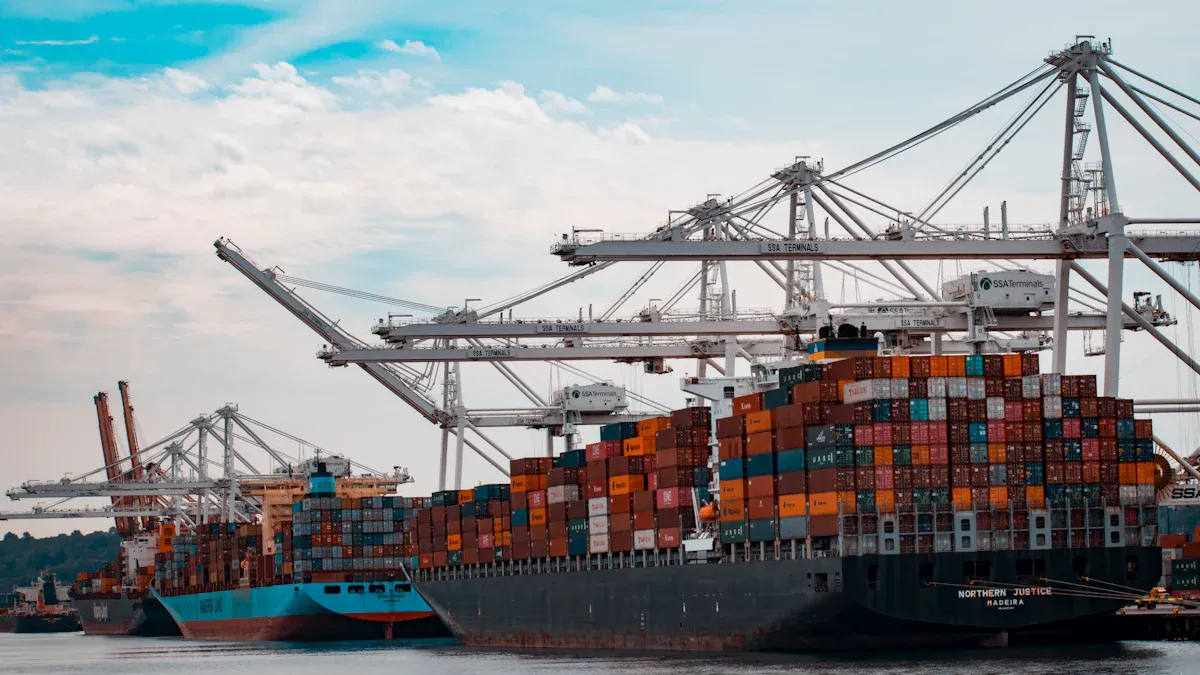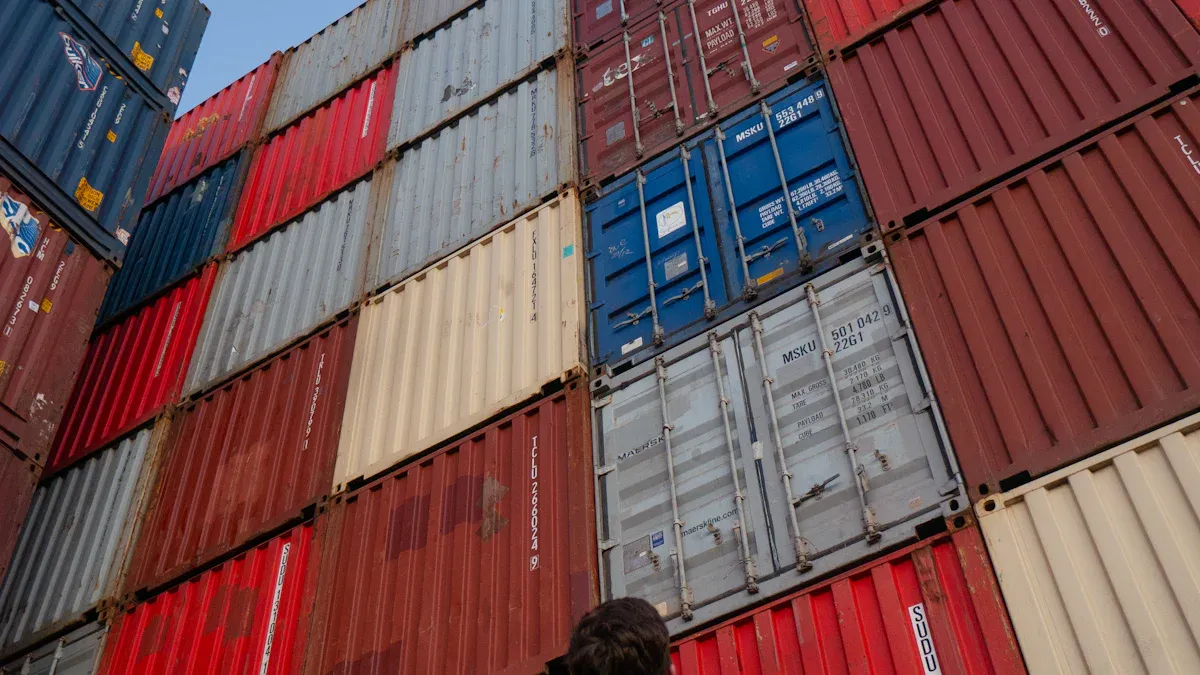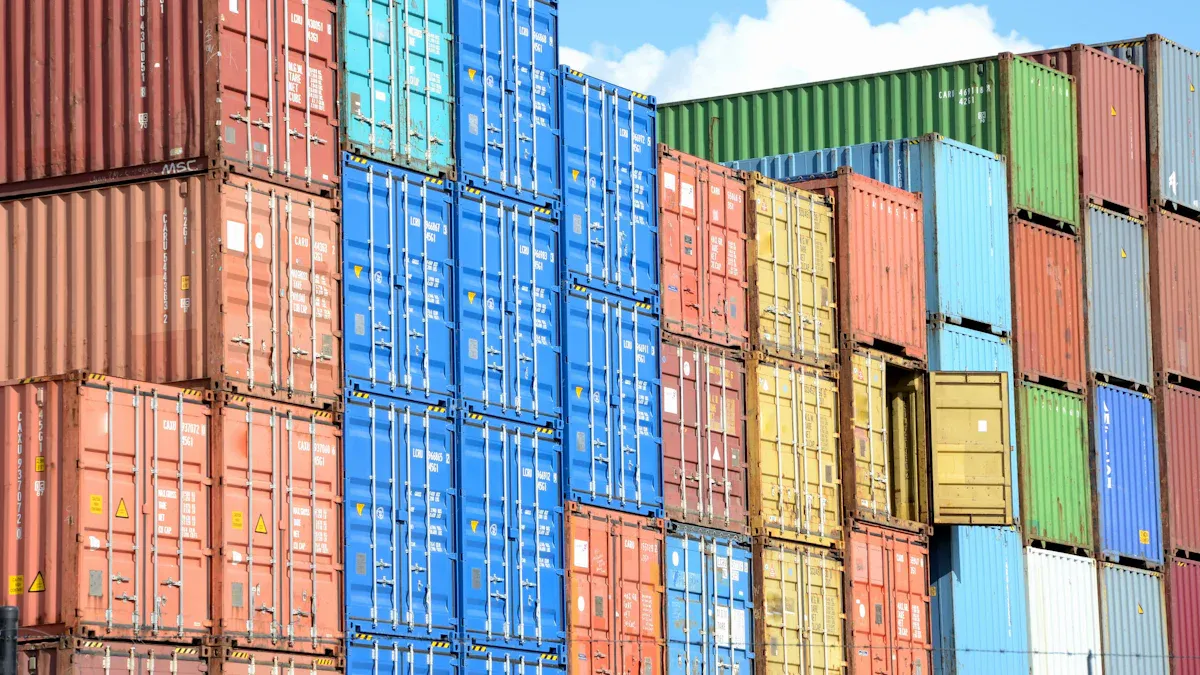How Bulk Purchasing from China Can Help Your Business Compete Globally

Bulk purchasing goods from China gives your business a competitive edge. You can reduce costs, access a wide variety of products, and scale operations efficiently. With its advanced manufacturing capabilities and robust trade infrastructure, China positions you to meet global demand and expand your market reach effectively.
Key Takeaways
Buying in bulk from China can save you money. Lower costs mean you can spend more on ads and growing your business.
You can choose from many products to match trends and seasons. This helps you stay ahead and get more customers.
Working closely with suppliers gives you better deals and good quality. Trust makes things easier and helps your business last longer.
Strategic Advantages of Bulk Purchasing Goods from China

Cost Savings and Economies of Scale
Bulk purchasing goods from China allows your business to leverage economies of scale, significantly reducing costs. China's manufacturing sector excels in mass production, which lowers the production cost per unit. By sourcing wholesale, you can take advantage of streamlined manufacturing processes and a surplus workforce that specializes in efficient production. Additionally, China's advanced infrastructure minimizes transportation costs and enhances supply chain operations, further boosting cost efficiency. These savings enable you to allocate resources toward other areas of growth, such as marketing or expanding your inventory.
Access to Diverse Products and Seasonal Flexibility
China's vast manufacturing capabilities provide access to a wide range of products, catering to various industries and customer preferences. Whether you are sourcing bulk items from China for e-commerce or retail, you can find products that align with market trends and seasonal demand. This flexibility allows you to adapt quickly to changing customer needs, ensuring your business stays competitive. For example, you can stock up on trending items during peak seasons or diversify your inventory to attract a broader customer base. This adaptability not only increases sales but also strengthens your brand's reputation.
Scaling Operations with Reliable Supply Chains
China's reliable supply chains make it easier to scale your operations efficiently. Establishing strong relationships with manufacturers and wholesalers ensures consistent product quality and better negotiation terms. Trust-based partnerships also provide preferential treatment during periods of high demand. Leveraging technologies like ERP and blockchain enhances transparency and reduces errors in the supply chain. Additionally, selecting logistics partners familiar with the Chinese market optimizes transportation routes and reduces lead times. These strategies help you meet customer demand, improve profit margins, and drive long-term business growth.
How to Buy Wholesale from China Effectively
Identifying Reliable Suppliers on Platforms
Finding trustworthy Chinese wholesale suppliers is crucial for successful sourcing. Online platforms simplify this process by connecting you with a vast network of suppliers. Popular platforms include:
Alibaba.com: Offers trade assurance, secure payment options, and a user-friendly interface.
GlobalSources.com: Provides verified suppliers, product sourcing tools, and online trade shows.
Made-in-China.com: Features a curated directory for various industries and supplier verification services.
DHgate.com: Specializes in wholesale sourcing with cost-effective options and product customization.
When evaluating suppliers, focus on their track record, on-time delivery rates, and client feedback. These criteria help you identify reliable partners who can meet your business needs and maintain quality standards.
Verifying Supplier Credentials and Building Trust
Before you buy bulk from China, verifying supplier credentials ensures you work with legitimate and capable partners. Follow these steps:
Check the supplier's business license and registration documents to confirm their legal status.
Arrange on-site visits to inspect manufacturing facilities and observe operations.
Request product samples to evaluate quality and adherence to specifications.
Use third-party inspection services for unbiased assessments of the supplier's capabilities.
Building trust with suppliers is equally important. Cultivate personal connections, known as guanxi, to foster long-term relationships. Respecting their reputation, or miànzi, strengthens partnerships. Regular communication and face-to-face meetings further enhance trust and transparency.
Networking at Trade Fairs and Industry Events
Trade fairs in China provide excellent opportunities for sourcing products from China and building relationships with suppliers. Events like the Canton Fair and China International Import Expo attract numerous exhibitors and buyers. To maximize your experience:
Research trade shows relevant to your industry.
Prepare a list of sourcing requirements before attending.
Visit exhibitor booths to explore products and services.
Engage with suppliers by asking questions about their capabilities.
Follow up with potential partners after the event to evaluate their suitability.
These events not only help you expand your inventory but also allow you to establish connections that can drive sales and improve customer satisfaction.
Managing Logistics and Costs When You Order from China

Shipping Options and Cost Optimization
Choosing the right shipping method is essential for reducing costs when you order from China. For larger shipments, consider Full Container Load (FCL) shipping. It offers lower costs per unit compared to Less than Container Load (LCL). Efficient packing is another critical factor. Ensure that every inch of container space is utilized to avoid paying for unused areas. Working with freight forwarders who provide value-added services, such as warehousing and consolidation, can further optimize your shipping expenses. Additionally, leveraging Free Trade Agreements (FTAs) can help reduce import duties, lowering your overall costs. Planning shipments during off-peak seasons and negotiating better rates with freight forwarders are also effective strategies to save money.
Navigating Customs and Import Regulations
Understanding customs regulations is crucial when importing products from China. Common challenges include documentation errors, incorrect classification of goods, and pricing issues. To avoid delays and penalties, ensure all paperwork, such as commercial invoices and certificates of origin, is accurate. Familiarize yourself with Harmonized System (HS) codes to classify goods correctly and declare true transaction values to prevent fines. Research import restrictions for your destination country and obtain any necessary permits. Adhering to inspection and quarantine rules is equally important to ensure smooth customs clearance. Consulting customs experts or using third-party services can help you navigate these complexities effectively.
Streamlining the Supply Chain Process
Streamlining your supply chain ensures timely delivery and cost efficiency. Collaborate with reliable suppliers and freight forwarders to coordinate logistics and shipping arrangements. Optimize packing to reduce wasted space and lower shipping costs. Implement stringent quality control measures to maintain product standards and minimize returns. Preparing all necessary documentation in advance helps avoid customs delays. Building long-term relationships with suppliers and diversifying your supplier network can mitigate risks and improve reliability. Embracing technology, such as inventory management software, enhances efficiency and ensures you meet customer demand without overstocking or understocking your inventory.
Ensuring Product Quality When You Buy Bulk from China
Conducting Inspections and Quality Audits
Ensuring product quality is critical when you buy bulk from China. Conducting inspections and quality audits helps you verify that your wholesale orders meet your business's standards. Inspections can confirm the existence of your items, verify labeling and barcoding, and ensure the correct quantity. They also allow you to check product quality and packaging, reducing the risk of errors or deliberate mistakes by the supplier.
Here’s a quick overview of the benefits and challenges of inspections:
Pros | Cons |
|---|---|
Verify your items exist | Extra expense |
Verify that your products are labeled and barcoded | |
Verify the number of products is correct | |
Inspect product quality | |
Inspect product packaging | |
Avoid non-deliberate/deliberate and careless mistakes from supplier | |
Verify your shipment before the final payment | |
Prevent all future risks | |
Suppliers will take your orders more seriously | |
Improve your brand's reputation, which may increase sales |
By implementing quality control methods like pre-shipment inspections and third-party audits, you can prevent costly mistakes and maintain your brand’s reputation.
Communicating Clear Specifications
Clear communication with your supplier is essential to meet quality standards. Providing detailed product specifications ensures that your sourcing process aligns with your expectations. Key elements of effective specifications include:
Key Element | Description |
|---|---|
Specific Quality Standards | Define clear benchmarks for product quality and incorporate certifications. |
Detailed Inspection Procedures | Outline steps for inspections at various production stages. |
Penalties for Non-Compliance | Specify financial penalties for failing to meet quality standards. |
Approval and Rejection Processes | Clearly define criteria for accepting or rejecting products. |
To enhance clarity, create a quality control checklist that includes measurements, materials, packaging, colors, and labels. Use simple language to avoid confusion, and incorporate visual aids like diagrams or photos. Follow up frequently to confirm alignment on specifications and deadlines. These steps ensure your supplier understands your requirements and delivers products that meet your expectations.
Establishing Long-Term Supplier Relationships
Building long-term relationships with your supplier fosters trust and improves sourcing efficiency. Strong partnerships lead to better terms, transparent information sharing, and opportunities for business expansion.
Benefit | Description |
|---|---|
Business Expansion | Good relationships with suppliers facilitate business growth across various markets and niches. |
Transparent Information | Trust leads to suppliers providing accurate and relevant industry information for better planning. |
To cultivate these relationships, focus on guanxi (personal connections) and respect your supplier’s reputation (miànzi). Regular communication and a collaborative approach strengthen partnerships. Involve your supplier in decision-making to foster innovation and mutual benefits. By showing commitment to a long-term partnership, you can secure reliable sourcing and improve your sales performance.
Overcoming Cultural and Legal Challenges in China
Addressing Language Barriers and Cultural Differences
Navigating language barriers and cultural differences is essential when working with a supplier in China. Miscommunication can lead to delays, errors, or strained relationships. To overcome these challenges:
Hire professional translators for critical meetings and document translations.
Include team members fluent in Chinese to avoid misunderstandings.
Learn basic Mandarin phrases and adapt your communication style to align with Chinese business etiquette.
Cultural differences also play a significant role in negotiations. Building strong personal relationships, or guanxi, fosters trust and cooperation. Avoid confrontational tactics to preserve the supplier's dignity, or face. Patience is key, as negotiations may take longer than expected. Understanding these nuances ensures smoother interactions and better outcomes for your business.
Drafting Contracts and Protecting Intellectual Property
Drafting contracts with a supplier in China requires careful attention to detail. Specify the contract language, as the Chinese version often prevails in disputes. Tailor agreements to the specific deal, ensuring they align with Chinese law. Clearly define quality standards and link payments to inspection results to guarantee satisfaction. Collaborating with a lawyer familiar with Chinese legal frameworks ensures enforceability.
Protecting intellectual property (IP) is equally important. Register your patents, trademarks, and copyrights in China to secure legal protection. Conduct thorough due diligence on potential suppliers to assess their IP protection history. Strong agreements, such as NNN (Non-Disclosure, Non-Use, Non-Circumvention) contracts, minimize risks of IP infringement. These steps safeguard your innovations and maintain your competitive edge.
Understanding Legal Frameworks for International Trade
Understanding China's legal frameworks for import and trade is crucial for compliance. Familiarize yourself with import regulations, including product certifications and labeling requirements. Research Free Trade Agreements (FTAs) to reduce tariffs and streamline the import process. Collaborate with customs experts to navigate complex regulations and avoid penalties.
Additionally, stay informed about changes in trade policies that may impact your business. Proactively addressing legal challenges ensures smoother operations and strengthens your position in the global market.
Bulk purchasing goods from China gives your business a competitive edge in global markets. You can reduce costs, access diverse products, and scale operations effectively. Success depends on thorough research, strong supplier relationships, and careful management of logistics and quality. By leveraging China's manufacturing strengths, your business can excel in e-commerce and international trade.
FAQ
What are the best platforms to find reliable suppliers in China?
You can use platforms like Alibaba, GlobalSources, and Made-in-China. These platforms offer verified suppliers, trade assurance, and secure payment options to ensure safe transactions.
How can you ensure product quality when buying in bulk?
Conduct pre-shipment inspections, request product samples, and hire third-party auditors. Communicate clear specifications to suppliers and establish penalties for non-compliance to maintain quality standards.
Tip: Use a quality control checklist to avoid misunderstandings and ensure your expectations are met.
What is the most cost-effective shipping method for bulk orders?
Full Container Load (FCL) shipping is the most cost-effective for large shipments. It reduces costs per unit and optimizes container space, saving you money on transportation.
See Also
Discovering Savings With B2B Wholesale Buying Strategies
A Comprehensive Guide to Wholesale Purchasing for Entrepreneurs
Effective Negotiation Techniques for Working With Wholesale Vendors
About US
Follow Us
Hello,Friend,
I am Mary from Helius, we are manufacturer of LED lighting products with more than a decade of experiences.
We offer hot selling products in market and guarantee the quality with competitive cost.
Let’s have more discussion on your inquiry.
Or you can reach out me via what’s up/tele gram +8618123952945 if it’s favorable to you.
Address
4th Floor, Building A16, Intelligent terminal industrial park of Silicon Valley, Dafu Industrial Zone,Guanlan, Shenzhen, 518110 China
Contacts
mary@heliuslights.com
heliuslight04@hotmail.com
+0086 18123952945
